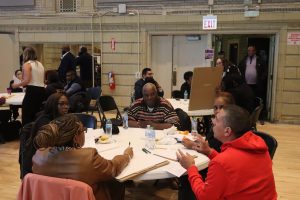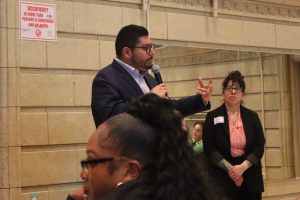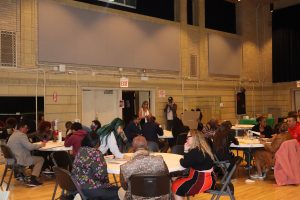Riot Fest permit fees fund Douglass Park improvements
By Igor Studenkov For Chronicle Media — June 18, 2025
Douglass Park neighbors split into groups to discuss the participatory budgeting process for spending Riot Fest permit fees. (Photos by Igor Studenkov/for Chronicle Media)
Ever since the Riot Fest punk rock festival moved from Chicago’s Humboldt Park neighborhood to North Lawndale’s Douglass Park 10 years ago, one of the major complaints from neighbors is that the fest leaves plenty of damage and little in the way of benefits.
The Chicago Park District says that things will be different this time.
The newest contract with Riot Fest earmarks 30 percent of the permit fees for improvements in Douglass Park specifically. The Park District says that it will use the Participatory Budgeting process to let residents propose improvements and vote on which improvements the money will be spent.
The first meeting, which was held at the Douglass Park fieldhouse on May 21, was meant to set the general parameters for the process, including who would be eligible to vote and what kind of outreach they would do.
While the attendees offered plenty of ideas, questions emerged about for what the money could and couldn’t be used. There is no clear timeline for when the process might be completed — but it won’t necessarily be before this year’s Riot Fest rolls around.
Douglass Park is one of the largest neighborhood parks not just on the West Side, but in the entire city. While North Lawndale residents get a lot of use out of the park, it also gets traffic from the nearby Little Village neighborhood. It includes multiple athletic fields, an outdoor pool, a mini-golf course, two playgrounds and a fieldhouse that hosts a variety of programs year-round.
Residents of both neighborhoods have long complained that the festival causes traffic congestion, takes the south half of the park out of commission for weeks due to damage caused by festgoers, as well as noise and parking issues.
In 2024, Riot Fest announced that it was moving to SeatGeek Stadium in southwest suburban Bridgeview. The fest ultimately decided to stay put. In April, promoters signed an agreement with the Park District that will last until 2027, with an optional two-year extension.

Chicago Park District CEO Carlos Ramirez-Rosa addresses the crowd at a participatory budgeting meeting, assuring residents that their ideas are being heard.
Riot Fest agreed to pay the permit fee that’s either $575,000 for the first year, with a $15,000 increase annually, or a portion of the ticket revenue, whichever is greater. The park district estimates that it would get around $3 million to $4 million over the next three years, with about $1 million of that going to Douglass Park.
Michael Merchant, the Park District’s chief strategy and engagement officer, told Chronicle Media that, normally, 90 percent of permit fees festivals pay go into a fund that’s used toward capital projects throughout the entire Park District. Only about 10 percent are used at the festival location. Under the new contract with Riot Fest, that number was increased to 30 percent.
The shift, Merchant said, was in response to “some community members (being) concerned about the fact that their park is being impacted.” The Park District, he said “wanted to make sure that the community members have some agency.”
The participatory budgeting process was pioneered in the North Side’s 49th Ward and has since spread to several wards all over the city. While the particulars vary, the general idea is to let residents pitch how the government funds should be spent, and then vote on which ones should proceed.
One difference with the Riot Fest permit fees is that the residents, not the officials, set the basic parameters. The Park District is collaborating with the University of Illinois Chicago’s Great Cities Institute, which assisted several aldermen in setting up participatory budgeting in their wards in the past.
Ramirez-Rosa’s assistant Lucio, who uses one name and they/them pronouns, facilitated the May meeting. They told Chronicle Media that the timing of the process “depends on the pace of the community. The process, Lucio said, won’t necessarily be completed before this year’s Riot Fest, which will take place on Sept. 19-21.

Resident propose permit-fee allocations.
The May 21 meeting saw attendees who lived and/or worked in both North Lawndale and Little Village. The meeting followed a format that has become common in city public outreach. The attendees were broken up into groups and asked to discuss several topics — in this case, what kind of projects the money should be spent on, how the voting process would go, who should be eligible to vote and how they wanted to get the word out about the participatory budgeting process. The groups then reconvened, and each group chose a member to summarize what they agreed on.
When it comes to eligibility, there was a broad agreement that residents from both North Lawndale and Little Village should be allowed to vote — the groups just had different ideas for how far out they would go. Several suggested going by ZIP code, and one suggested sticking to anyone who lives within the four-block radius of the park.
There was a broad consensus that they should get the word out through some combination of social media posts, online newsletters and some in-person component, whether it’s sending out postcards or going door to door.
When it comes to projects, several groups said playgrounds need to be updated, athletic fields should get better lighting, and that Douglass Park’s scenic features like the pond should be cleaned up.
Restrooms were a recurring concern. Like several other parks throughout Chicago, Douglass Park currently only has restrooms at the fieldhouse, and smaller restrooms in the south half of the park have been closed for years.
Cook County Commissioner Michael Scott, D-2nd, who previously served as the 24th Ward alderman and worked for the Park District, said that those restrooms have been closed because maintenance has been more trouble than it was worth.
“We have a large homeless contingency that regularly defecated (all over the bathroom),” he said. “We have to bring n people in hazmat suits to clean that.”
As groups delved more into improvements, tensions started to emerge
When one group suggested that at least 25 percent of the money would go toward adding programming, such as dance classes, Lucio said that the money could only be used for physical improvements.
Scott said that, in his experience, simply putting money into new programming wasn’t enough.
“When we put the program here, we want people to show up,” he said, giving an example of ballet lessons that petered out due to low attendance.
Another group suggested money could be used for tree planting. Scott’s sister and current 24th Ward Ald. Monique Scott said that, while she “loved the tree idea,” the funding couldn’t be used for that, either, “because we have the forestry department.”
“I guess I’m confused,” said an attendee who described herself as a lifelong North Lawndale resident. “Are there guidelines, are there things we can’t ask for?”
“I’m sorry you feel shut down,” responded Lucio.
Ramirez-Rosa, who quietly sat next to the elected officials for much of the second half of the meeting, stood up and assured the attendees that they will be heard.
“What I heard tonight is an amazing dialogue,” he said. “I heard people express themselves and, as a result, we have a program wish list of what we’d like to see. We’re going to synthesize everything that was shared.”







